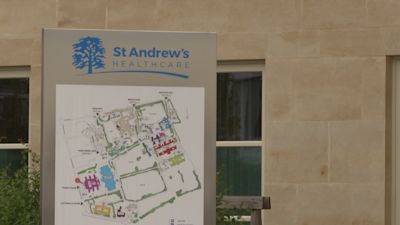Health watchdog bars mental health provider from admitting new patients after inspection

Watch a report by Graham Stothard
A mental healthcare provider has been barred from taking on new patients after a damning report by the Care Quality Commission (CQC).
Northampton-based St Andrew's Healthcare must seek approval from the CQC if it wants to admit new patients following an inspection in July.
The overall rating for the men's service remains 'requires improvement' and the overall rating for the women's service remains 'inadequate'.
Inspectors visited the men's and women's services and looked at:
Acute wards for adults of working age and psychiatric intensive care units (PICU)
Long stay/rehabilitation mental health wards for working age adults
Forensic/inpatient secure wards and wards for people with learning disabilities or autistic people.
Conditions were placed on the provider's registration. The conditions demand no new patients can be admitted to the forensic, long stay rehabilitation wards and the wards for people with a learning disability at the women's service and to the wards for people with a learning disability at the men's service, without consent from CQC.
It must also ensure there are adequate staffing levels so observations can be carried out safely. The report said staff should also receive appropriate training for their roles and that audits of incident reporting are completed.
An action plan detailing improvement must be sent to CQC on a fortnightly basis.
Stuart Dunn, CQC head of inspection for mental health and community services, said: "People who needed these services told us that they didn't always feel safe, and inspectors evidenced practice that reflected this.
"For example, people told us that staff fell asleep when they were supposed to be observing, and women in the long stay and rehabilitation wards told us that the ward often felt dangerous due to understaffing. "Understaffing continued to be a significant concern with both services being regularly short-staffed which often led to patients having their escorted leave, therapies or activities cancelled. In addition, not all staff were suitably qualified or competent to be carrying out their roles.
"The leadership team had not addressed issues CQC had highlighted at previous inspections, or ensured existing concerns were identified and acted on. This culture was also reflected at staff level, with some not knowing how to identify or manage risks such as blind spots which could place patients at risk of harm. Incidents weren't escalated effectively meaning lessons were not being learned and the risk of reoccurrence was high. "We will continue to engage with the provider and will return to check whether sufficient improvements have been made and will take further action if we don't see this."
Jess Lievesley, Chief Executive of St Andrew’s Healthcare, said he was "understandably disappointed" that the CQC has found a number of issues at the charity and apologised to patients, their families and carers.
In a statement he said: "We haven’t been able to provide the care consistently across all our wards at all times, particularly during what has already been a challenging period.
"This was a prolonged inspection at a highly challenging time and staffing levels were a key point raised by the CQC that underpinned a great many of the issues identified in the reports.
"There’s no disputing that staffing throughout the pandemic has been challenging for both St Andrew’s and other healthcare providers as our staff strictly adhered to the Government’s COVID-19 restrictions to keep patients safe."
He said that the charity accepted there were a number of areas which needed improvement and looked forward to working with the CQC
Following the inspection, the trust was told to make several improvements, including: At the women's service:
Patient observations must be carried out in line with policy.
Staff must follow the mental health act code of practice in relation to seclusion.
Wards must have the required numbers of suitably skilled staff.
Incidents must be recorded and reported appropriately.
At the men's service:
Lessons learned must be shared with the whole team when things go wrong.
Leadership, governance and culture must support the delivery of high-quality person-centred care.
Seclusion room environments must meet the mental health act code of practice.
Effective discharge plans must be in place for patients in the long stay and rehabilitation wards.
Staff must recognise and report any safeguarding incidents.
It is the latest critical report issued to the Trust by the CQC. Back in January 2019 it placed St Andrew's Healthcare's Fitzroy House in Northampton - a hospital for adolescents with mental health problems - in special measures.
Last year it said improvements had to be made over systemic failings.